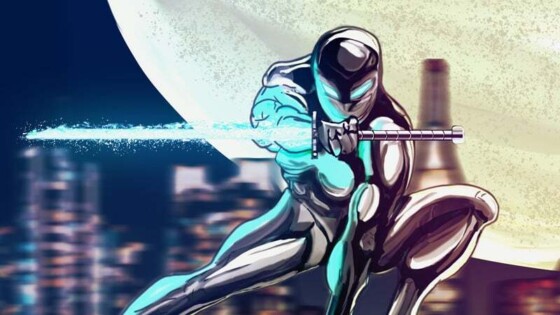Without a doubt, writing The Silver Ninja has been an incredible learning experience for me. From understanding the process of publishing a book, to improving my writing via short stories, to understanding how to create compelling characters, writing that book has given me hard lessons in what constitutes good story telling.
Since I know a few of you want to start writing your own books, I’ve decided to share the top five most important lessons I’ve learned in writing a book. Let’s begin:
- Resist the temptation to write flowery prose. “His deception was a sour milk she couldn’t stomach anymore.” (That doesn’t even make sense. Who would drink sour milk?)
When I first wrote The Silver Ninja I was inspired by the writing style of the original Max Payne video game from 2001.
“But dreams have a nasty habit of going bad when you’re not looking. The sun went down with practiced bravado. Twilight crawled across the sky, laden with foreboding.“ -Max Payne (2001).
Resist the urge to try to come up with a colorful way to describe a setting, an event, or an action. It’s okay to use them once in a while for emphasis or to drive a theme home but over usage gets very tiring to read. The less clear your words are the more frustrating it is to the reader. Sometimes when you’re trying to describe a really complicated action where the hero’s body is rolling through the air, wind pushing them back, hands cinched around the knees. It’s better just to say, “he flipped.”
- This also leads into show vs. tell. This is the age old dilemma that many beginning author’s struggle with. What I’ve found works for me is to keep literal descriptions of an action to a minimum. Instead of saying, “She punched him in the face.” Think of saying, “The thug’s jaw exploded as four bony knuckles crushed into his face.”
However, don’t underestimate the value of a tell. Sometimes you do need to say “she punched him” in order to make the sentence quick and snappy. Showing can sometimes increase your word count and will affect the pacing of your scene. So then the question becomes when do you tell and when do you show?
My general rule of thumb is to tell during scenes where you’re getting ready to transition to another scene. Or if you have an overly complex action sequence, use the tell to simplify and after you’ve trimmed the fat, strategically inject the show. Long descriptions slow the pace down to a slug’s crawl. Short. Tight descriptions make it faster.
Also, word choice is important. There is a difference between (empowered with new abilities) and (infused with incredible powers).
- SPAMMING ABOUT YOUR BOOK IS INEFFECTIVE AND ANNOYING! Not that I’ve done this myself but now that I’m on Twitter, Goodreads, and Facebook. I’ve found myself rolling my eyes and getting pissed off when someone trying to sell their book hits my feed. I also get doubly annoyed when people e-mail me for a book review request on books that are not even in genres that I’m interested in!
Now, I’m more than happy to promote author’s who have helped me out by beta reading and providing feedback and being generally cool people. However, when someone just comes by and randomly begs for a retweet or promotion (as if I even have that big of a following) that really gets on my nerves.
I know, I know, you want to get the word out on your book. I usually want to get the word out on my blogs and will share and re-post throughout the day. You want to sell books? Focus on delivering quality work. Be helpful, put your best foot forward, and always provide links to where people can buy your work but don’t shove it in their face.
- “I liked it,” or “it was good.” Is possibly one of the most frustrating bits of feedback you will get as an author. This will generally be from family and friends and it is the absolute worst. Why is it frustrating? Well, you can interpret those comments to mean anything. It could mean, “You’re family and I don’t want to hurt your feelings,” or “It wasn’t remarkable,” or “I genuinely liked it but it didn’t blow my socks off.”
As a writer you want people to love or hate your work. Feedback is always welcome whether its criticism or praise. If you want to learn how to improve your craft then you need to step out of your comfort zone and get feedback from people you don’t know. Sometimes you’ll get lucky and one of your loved ones will be brutally honest but most of the time its a struggle to get really good, solid feedback.
So if you want to step up your game, definitely seek out groups that are not afraid to say, “I thought your main character sucked and here’s why.”
- Last but not least, cause and effect. It wasn’t until very late in the game that I realized how important cause and effect is in ANY narrative. I didn’t even know about cause and effect as a writing technique until I listened to a speech from the South Park creators. What you want to create is a narrative that is driven by the actions of the characters. I’ve listed some examples down below.
Cause: “Character who has little money develops lung cancer.”
Effect: “Character becomes a drug dealer so he could leave money behind for his family.”
Cause: “Character B finds out Character A is a drug dealer.
Effect: “Character B tries to leave Character A.”
Cause: “Character A finds out Character B is trying to leave.”
Effect: “Character A gives Character B an ultimatum.”If your following scene is not a cause or is not affected by the previous scene, you may potentially create a scene that is irrelevant to your plot. It may play out something likes this:.
Cause: “Character A develops lung cancer.”
And then: “Character B went to buy shoes.”
Cause: “Character A becomes a drug lord.”
And then: “Character B had an affair.”The narrative becomes disjointed and makes it seem like you’re trying to tell two separate stories as one. This is what happened in The Cardinal in the Kremlin by Tom Clancy. It was filled with scenes that had no bearing on the plot which turned what should have been an exciting CIA book into a boring piece of crap. You can count on me talking about that book very soon™.
Well that’s all I have for you guys today. I’ve still got more content that I’m eager to share with you so make sure you continue to follow me on Facebook and Twitter for all the latest updates.




